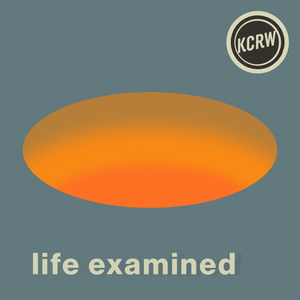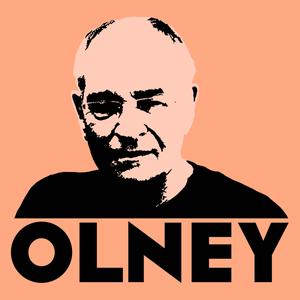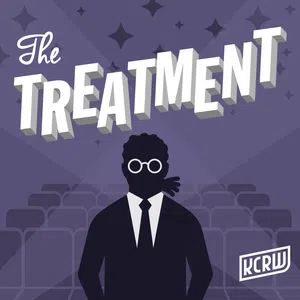
Life Examined
KCRW
KCRW's Life Examined is a one-hour weekly show exploring science, philosophy, faith — and finding meaning in the modern world. The show is hosted by Jonathan Bastian. Please tune in Saturdays at 9 a.m., or find it as a podcast.
- 4 minutes 44 secondsMidweek Reset: Finding a way (or path)
This week British author Raynor Winn reflects on healing, hope and resilience. Finding herself homeless and coping with her husband’s recent health diagnosis - Winn and her husband set off on a long distance walk. As they set out together they discover how their perspective changes - and how much of their anxiety and bitterness melt away.
This episode with Raynor Winn was originally broadcast, October 8th, 2023
4 December 2024, 8:00 am - 53 minutes 27 secondsRenowned psychologist Tara Brach on the power of Buddhism in modern therapy
*This episode was originally broadcast Saturday, June 26th, 2021
Over the past few decades, Buddhism and psychology have served as bridges connecting Eastern and Western thought. Believing that nothing is permanent, Buddhism presents an honest understanding of our minds — how we spend so much of our time thinking about the past and future, and struggle to stay in the present. Harnessing these insights, psychologists and therapists have incorporated Buddhism into therapy by teaching mindfulness meditation practices, and the power of observing our own thoughts and emotions rather than trying to get rid of them.KCRW’s Jonathan Bastian talks with Tara Brach, a clinical psychologist who has spent decades studying Buddhism, meditation, and the incorporation of Eastern thought into her Western practice. She holds a PhD in clinical psychology, and has spent dozens of years studying Buddhism and meditation. Brach, one of the most sought-after Buddist teachers in America, explains why the stillness of meditation is “exquisite,” and how the simplest of acts may be the purest. Her books include “Radical Acceptance, Embracing Your Life With the Heart of a Buddha,” “True Refuge: Finding Peace and Freedom in Your Own Awakened Heart,” and most recently, “Trusting the Gold: Uncovering Your Natural Goodness.”
1 December 2024, 8:00 am - 4 minutes 20 secondsMidweek Reset: On legacy letters
This week Rabbi Steve Leder on why we should consider what we leave those closest to us when we die to include a legacy letter or ‘ethical will.’ Rabbi Leder reminds us that it’s not only our material possessions that matter when we’re no longer around but what will be cherished most are our words, our guidance, and our love and gratitude.
This episode with Rabbi Steve Leder was originally broadcast, May 28th 2022
27 November 2024, 8:00 am - 53 minutes 28 seconds‘The Serviceberry’: Robin Wall Kimmerer’s guide to the gift economy
Potawatomi botanist Robin Wall Kimmerer discusses the philosophy of a “gift economy” in her latest book The Serviceberry, expanding on the theme of reciprocity from her 2013 book Braiding Sweetgrass.
At a time of increasing consumerism and declining natural resources, gifting, Kimmerer reminds us, is a truly renewable resource. She draws on the example of the serviceberry and its remarkable ability to give:
“In my Potawatomi language, the word for berry ‘min’ is also the root word for gift and for gift giving. So when you see them hanging there ... They're just meant to attract us, right? And they do! They have what we need in sweetness, flavor, and calories. Every time I pick berries, it just opens that sense of ‘I didn't work for these. I didn't deserve these. I don't own these, and yet here they are in my bowl.’”
The serviceberry works as a simple metaphor for Kimmerer to explain why the “gift economy” is so ecologically important. Kimmerer explains that a small dish of berries can multiply with every exchange. Its currency isn’t measured in dollars and cents, but in the sense of community and relationships that gifting and gratitude fosters.
“The goods and services that economics are meant to provide for us, they are material, they are the things that we need in order to live,” Kimmerer continues. “Those are often commodities, but the things that we hold most precious, like pure water, the taste of wild berries, and the regard of our neighbors — the trust of our neighbors — those can never be commodified. For those, we have a ‘gift economy.’”
The Serviceberry is an invitation to think about how we live our lives. Drawing on native beliefs and traditions, Kimmerer explains that the abundant fruits of the humble serviceberry serve as a sweet reminder of our interdependence. It reminds us that all flourishing is mutual, “from bees, to birds, to microbes, to us.”
With the limitations of resources and the finite nature of water and minerals — we should strive for an “economy of balance rather than growth.”
Delve deeper into life, philosophy, and what makes us human by joining the Life Examined discussion group on Facebook.
24 November 2024, 8:00 am - 4 minutes 45 secondsMidweek Reset: On Awe
This week clinical psychologist and author Dacher Keltner delves into the science and mysteries surrounding awe and shares that awe is not just found in nature or music but most often in the moral beauty of other people.
This episode with Dacher Keltner was originally broadcast, February 4th, 2023
20 November 2024, 8:00 am - 53 minutes 31 secondsFood, Farming, Faith and Hip Hop; Black earth wisdom and the fight for environmental and racial justice
The plight of Black farmers in America has a dark history. The trauma of stolen lands and exploited labor may explain why there are now relatively few Black and Indigenous people in farming, agriculture, or even within environmental activism.
Leah Penniman is one farmer fighting to change that. Penniman explains that there’s a rising generation of Black and brown farmers reexamining their relationship to the land and reclaiming the farming and agricultural practices once held by their ancestors.
Penniman, who is the co-founder of Soul Fire Farm, says that “Black farmers had already declined from 14% of the nation's farmers in the early 1900s to just about 1% today.” As a result of racism and discrimination Penniman says, “millions of acres of land were lost out of the Black community, and with that so much intergenerational wealth and knowledge.”
Penniman says her mission with Soul Fire Farms was to help end racism and injustice in the food system and explore and embrace of her own ancestral heritage to the land and agriculture; “nature as a source of spiritual connection permeates African diasporic thinking and very much informs the way we [operate] at Soul Fire, but also [how] the broader rising generation are conceptualizing our relationship to the land.”
“The food system pertains to all of us. All of us eat, so all of us are connected. All of us are complicit, but also all of us have these immense opportunities to contribute to change as consumers in the food system.”
For over 20 years the Reverend Lennox Yearwood has also been fighting for racial and environmental justice. Born in Shreveport, Louisiana, Rev. Yearwood has always had a strong affinity for music; “all music, particularly hip-hop and jazz. R&B, the Blues… for me, music was really more a pathway to the soul, just a way to escape. Music is so uplifting, it's so encouraging, it's just so beautiful — particularly with instruments and singing.”
Rev. Yearwood is President and CEO of the Hip Hop Caucus — a national nonprofit, nonpartisan organization which began in 2004 and leverages hip-hop culture to encourage young people to vote and participate in the democratic process. Rev. Yearwood’s passion for music ties into his environmental activism and his work on human rights issues in the Gulf Coast region after Hurricane Katrina.
“Hip-hop’s roots are based in people who have been put in sometimes very difficult situations. They're using their cultural expression to shape their political experience. They’re talking about what they're going through, and they're trying to use music and culture to explain and sometimes bring light to situations.”
“Chuck D said that [hip-hop] ‘became the CNN for those communities.’ And so … listening to that, hearing that music, and hearing the power behind it definitely drew me into wanting to be a part of it.”
More: Chuck D on creating ‘naphic grovels,’ embracing mistakes (Press Play, 2023)
Rev. Yearwood is actively involved in seeking environmental justice. He continually highlights racial disparities and heightens awareness of the social and economic issues that negatively impact Black people. The Hip Hop Caucus’ short film Underwater Projects sheds light on the coastal urban flooding happening in Norfolk, Virginia — including its effects on a historically Black public housing community.
Eternally hopeful and with a strong sense of faith, Rev. Yearwood is optimistic that things can be done to make life better: “When we come together, we do well. That's my prayer, that's what keeps me excited, motivated, and lets me know that at some point in time… That the power of humanity is just an amazing, beautiful thing.”
Delve deeper into life, philosophy, and what makes us human by joining the Life Examined discussion group on Facebook.
17 November 2024, 8:00 am - 4 minutes 29 secondsMidweek Reset: On Resilience
This week clinical psychologist George Bonanno at Columbia University explores resilience and challenges some traditional notions about trauma and says that humans are far better at confronting and coping with adversity than we think.
This episode with George Bonanno was originally broadcast September 17th, 2023
13 November 2024, 8:00 am - 53 minutes 24 secondsRyan Holiday: A Stoics guide to doing the right thing
Throughout our lives we face situations that require a response. While events unfold around us, how we choose to react — or whether we choose to react at all — is entirely within our control.
The concepts of justice and virtue are central to author Ryan Holiday’s latest book, Right Thing, Right Now: Good Values. Good Character. Good Deeds. Holiday explores how the ancient Greek philosophers Marcus Aurelius, Aristotle, and Seneca sought to provide a more pragmatic approach to happiness and virtue… And whether those same principles can impact how we live today. “The Stoics,” Holiday says, “are all about focusing on what's in your control.”
10 November 2024, 8:00 am - 53 minutes 25 secondsBreaking beyond tribalism and apathy: The brighter side of politics
With the U.S. election just days away there’s a palpable sense that with whichever candidate emerges victorious, it could signal the beginning of the end for their opponents.
Whether this election is truly different from those of the past, or simply a byproduct of hyperfocus from the media — voters shouldn’t throw their hands up in despair. Throughout American history, everyday people have driven change in small and incremental steps. And these steps are largely unseen and unheralded.
In her book The Small and the Mighty; Twelve Unsung Americans Who Changed the Course of History, author and former high school teacher Sharon McMahon emphasizes that now is not the time for apathy: “We get so caught up in Trump vs. Harris, that it's easy to forget that our real lives are being deeply impacted by the people who literally work on the other side of town. … We do not have to wait for the right leader to win an election.”
McMahon says hope is a key element in fighting any anxiety we may have about the election. “Hope is not a feeling that you wait to experience,” McMahon tells us. “Hope is not attached to an individual. It is not attached to the outcome of an election.”
“Hope is a choice that we can make,” she continues, “Hope is an orientation of the spirit. In the words of Bryan Stevenson: ‘It's an orientation of our spirit, and we do not have the luxury of giving up hope.’ Because hope is our only chance at making positive change in the United States and in the world.”
The deep political divisions in America have fostered a belief that as a nation we have become increasingly tribal. In fact, if you listen to any pundit, “tribalism” is used in a negative way.
In his new book TRIBAL: How the Cultural Instincts That Divide Us Can Help Bring Us Together, author Michael Morris explains why the words triablism or tribe are not only misused, but also misunderstood. Tribes used to be referred to as “an enduring community,” Morris says. “During the era of colonial expansion and imperialism, tribalism started taking on a negative connotation involving notions of stasis and primitivism.”
“The distinctive way of social life in our species is living in very large communities that transcend kith and kin, that are that are glued together by shared ideas, by shared beliefs, otherwise known as culture,” Morris affirms. “And so, large groups held together by cultural glue is the human form of social organization. Otherwise known as tribal living.”
Morris highlights that tribes have played a crucial and positive role in human evolution. Tribes are, “what enable us to collaborate intellectually. And almost everything impressive that humans have built has come from intellectual collaboration.”
Tribes also facilitate the sharing of knowledge as Morris further imparts: “Today, 99% of what you and I know is not something that we figured out directly ourselves. It's the knowledge that we inherited. We can not only do impressive things based on other people's knowledge, but we can collaborate with other members of our culture because we have this shared legacy of knowledge in common with them.”
Delve deeper into life, philosophy, and what makes us human by joining the Life Examined discussion group on Facebook.
3 November 2024, 7:00 am - 4 minutes 19 secondsMidweek Reset: The Art of the Imperfect
This week Oliver Burkeman journalist and author of “Meditations for Mortals” discusses the complexities of trying to be perfect in an imperfect world. Accepting our limitations, he says, is a pathway to liberation and happiness.
This episode with Oliver Burkeman was originally broadcast October 27, 2024
30 October 2024, 7:00 am - 53 minutes 28 secondsOliver Burkeman and the art of imperfectionism
Journalist and author Oliver Burkeman discusses the complexities of happiness, well-being, and productivity — emphasizing the futility of seeking a single solution.
Burkeman offers guidance on why we shouldn’t sacrifice the very essence of living in search of perfection and doing it all. Treasuring those simple moments in daily life, which doesn’t mean settling for less, Burkemans says, “is a precondition for a really full life.”
Delve deeper into life, philosophy, and what makes us human by joining the Life Examined discussion group on Facebook.
27 October 2024, 7:00 am - More Episodes? Get the App
Your feedback is valuable to us. Should you encounter any bugs, glitches, lack of functionality or other problems, please email us on [email protected] or join Moon.FM Telegram Group where you can talk directly to the dev team who are happy to answer any queries.
 Welcome to LA
Welcome to LA
 Greater LA
Greater LA
 The Legal Eagle Files
The Legal Eagle Files
 To the Point
To the Point
 The Treatment
The Treatment
 Press Play with Madeleine Brand
Press Play with Madeleine Brand